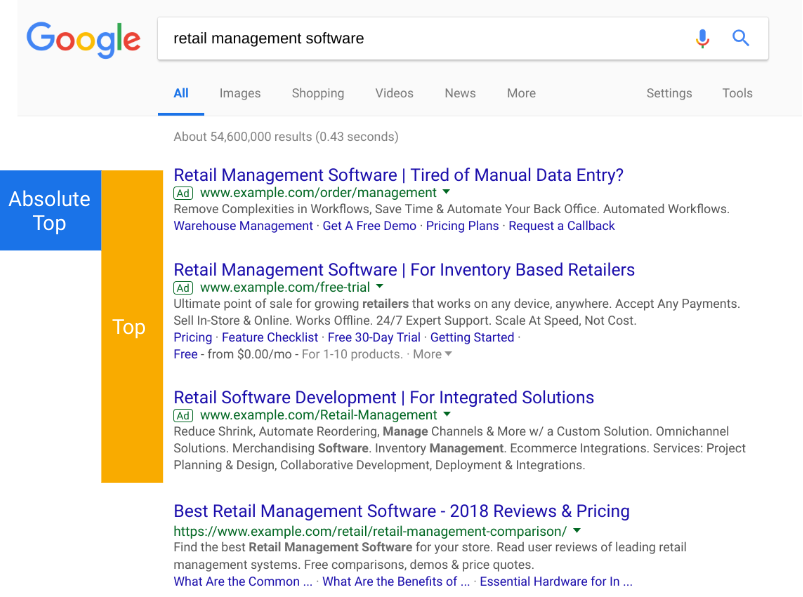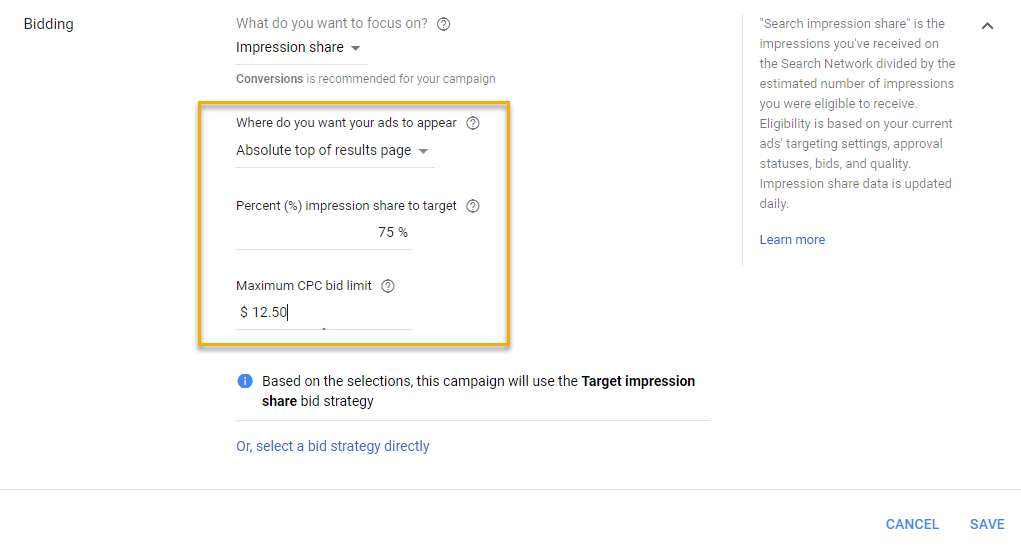
In February, Google announced they plan to sunset the average position metric. While this change won’t take place until September 2019, it’s still a major announcement that has a lot of search marketers worried. After all, average position is one of the main metrics that advertisers look at when making manual bid adjustments and assessing visibility and position on the SERP.
Google began moving away from average position in November, when they released a handful of new search ad position metrics to give a clearer picture of where ads are actually showing up on the SERP:
Impr. (absolute top) %
The percent of your ad impressions that are shown as the very first ad above the organic search results.
Impr. (top) %
The percent of your ad impressions that are shown anywhere above the organic search results.
Search (absolute top) IS
The impressions you’ve received in the absolute top location (the very first ad above the organic search results) divided by the estimated number of impressions you were eligible to receive in the top location.
Search (top) IS
The impressions you’ve received in the top location (anywhere above the organic search results) compared to the estimated number of impressions you were eligible to receive in the top location.
What is Google suggesting?
Instead of bidding toward a specific position, Google is suggesting that advertisers start bidding toward improved impression share. With the metrics above, advertisers are able to see what percentage of their impressions are showing up at the very top of the page (absolute top) or above the organic results (top).
Although average position is helpful, it doesn’t necessarily tell advertisers if their ad is showing up above the organic results or not. For example, the search query “phone cases” yields one text ad above the organic results and three below them:
In this case, it would be better to look at search (top) IS or search (absolute top IS) to get a sense of where your ad is actually showing up. Nordstrom is technically in the second position, but it’s likely getting significantly fewer impressions than Ketget in the first position—especially on a mobile device. Average position doesn’t tell us this, but the new impression share metrics do.
How will this impact bidding?
Instead of focusing only on average position when making bid adjustments, try pulling in some of the new impression share metrics to influence your adjustments. Going back to the example above, average position doesn’t provide the most accurate information when it comes to exact position on the SERP. Let’s walk through an example.
Here we have three keywords with average positions between 1 and 2, but their search top IS and search abs. top IS are slightly different. While you might be satisfied with these average positions, you get a better sense of how much room there is to expand by looking at the IS metrics. Google also recently released Click Share for search campaigns, which is another good metric to look at when making bid adjustments.
Depending on your goals, you may want to increase your bids to show more often above the organic results (search top IS) or show more often in the very top spot (search Abs. top IS) to increase traffic.
Additionally, you can bid to impression share for the top of the search results or the absolute top of the search results. If you go into campaign settings, you can change the bidding strategy and include a target impression share and bid cap. There are plenty of other automated bidding strategies that you can leverage to hit your goals as well!
Takeaways
While the disappearance of average position may seem scary, advertisers have until September to prepare! Take some time to learn about the new impression share and position metrics, adjust your bidding strategies where appropriate, and begin to think about how you should report on these additional metrics.
If you have any other questions, we’re always here to help!

















